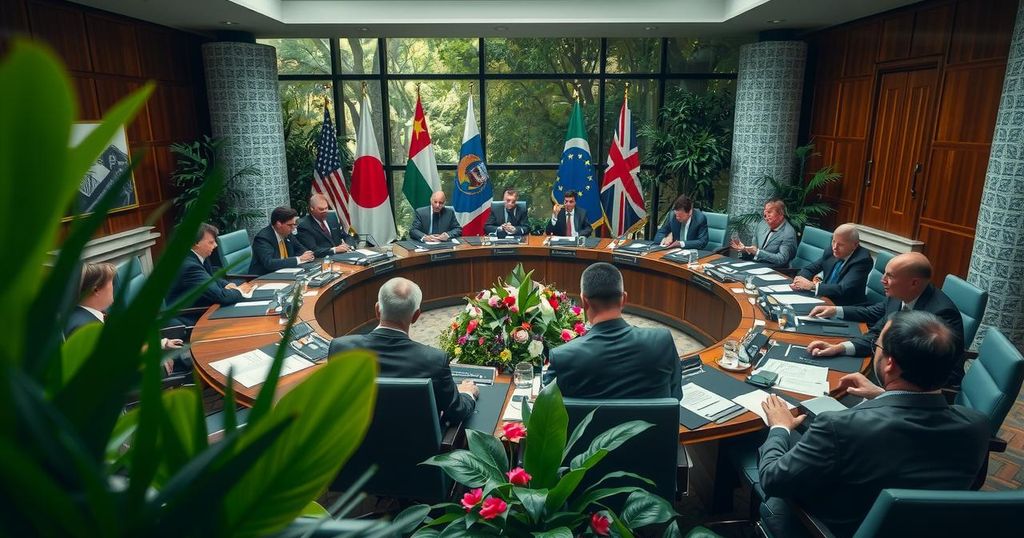G20 Leaders Convene to Address Climate Change and Sustainable Development

The G20 leaders are meeting to discuss climate change and sustainable development, aiming to strengthen financial commitments for climate initiatives ahead of the COP29 summit. Tensions exist between developed and developing nations concerning financial responsibilities, while discussions on a legally binding treaty to limit plastic pollution are also taking place. With significant shifts in global leadership anticipated, the outcomes of these negotiations hold critical implications for future climate action.
On Tuesday, leaders of the Group of 20 (G20) economies convened to address sustainable development and the transition to cleaner energy in an endeavor to enhance prospects for a successful resolution to climate change discussions at the forthcoming U.N. climate talks in Azerbaijan. A day prior, the COP29 summit host had urged G20 member nations to demonstrate a unified commitment to combating climate change, aiming to revive negotiations that have lost momentum in Baku, Azerbaijan. Amid indicators that the world is headed towards its warmest year on record, G20 leaders are keen to bolster climate initiatives before the potential return of Donald Trump to the U.S. presidency in January. Trump has signaled intentions to withdraw from the Paris Agreement on climate change and to retract U.S. policies aimed at mitigating global warming, posing a looming challenge for ongoing climate efforts. In a joint declaration released late Monday, G20 leaders emphasized the necessity to “rapidly and substantially increase climate finance from billions to trillions from all sources” to adequately address climate change. Additionally, the leaders underscored the critical need for COP29 negotiators to finalize a new financial target for climate assistance from wealthy nations to developing countries. While the G20 statement highlighted the need for resolution on financial commitments, it refrained from offering concrete solutions for the U.N. summit set to conclude on Friday. Economists advocate for setting the financial target at a minimum of $1 trillion annually. Differing perspectives emerged, with developed nations, including those within Europe, calling for an expanded contributor base to include affluent developing nations such as China and wealthier states in the Middle East. Conversely, developing countries, including G20 host Brazil, resisted such proposals, maintaining the argument that developed nations bear the primary responsibility for climate change. As negotiations unfolded, reports indicated a proposal suggesting that contributions from developing countries could be made on a voluntary basis, but this language was ultimately omitted from the final agreement. During the commencement of the annual summit in Rio de Janeiro on Monday, President Luiz Inacio Lula da Silva asserted that the impacts of climate change are manifest globally and require immediate action. The G20 group is pivotal in orchestrating responses to climate change, controlling 85% of the global economy and accounting for over three-quarters of emissions that contribute to climate change. Furthermore, discussions have commenced regarding a legally binding treaty aimed at reducing plastic pollution, with a target for consensus by the end of 2024, following over two years of negotiations.
The Group of 20 (G20) comprises major economies that play a crucial role in global financial and environmental policies. This gathering primarily seeks to address significant issues regarding climate change, particularly as the effects become increasingly evident. With ongoing negotiations for the COP29 climate conference, the G20 is under pressure to provide strong leadership and support for financial commitments to developing nations, especially in light of anticipated shifts in U.S. climate policy. The discussions also extend to agreements aimed at limiting plastic pollution, emphasizing a comprehensive approach to sustainability and environmental responsibility.
In summary, the G20 summit denotes a critical moment for global climate discussions as leaders seek to enhance financial commitments and strengthen international cooperation against climate change. Amidst apprehension regarding potential shifts in U.S. policy, the necessity for robust climate finance initiatives remains paramount. The discussions on plastic pollution further underline the G20’s role in innovative environmental governance. As the summit’s outcome becomes apparent, the world watches closely to assess the commitments made towards a sustainable future.
Original Source: stratnewsglobal.com






